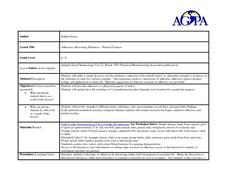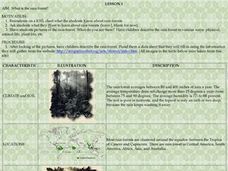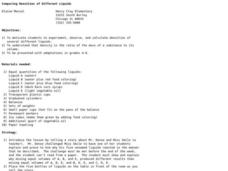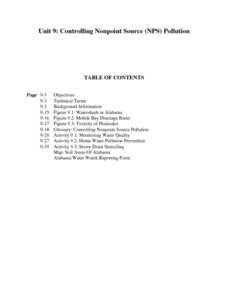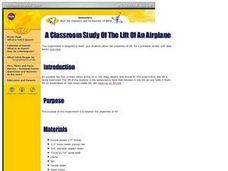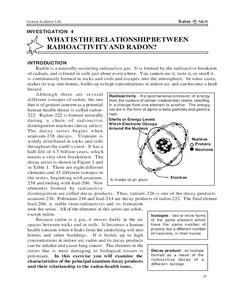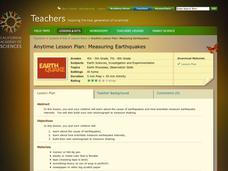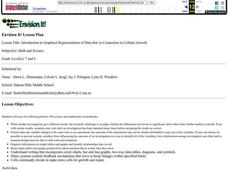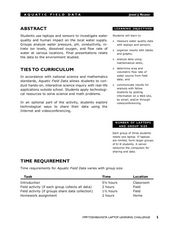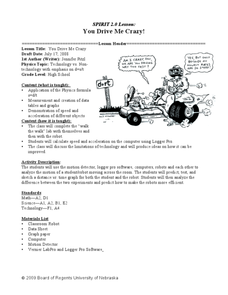Curated OER
How Can You Predict the Characteristics of an Unborn Baby?
Students compare three sets of unlabeled human chromosomes and gather related data, trace chromosomes to pair them, and make observations about them.
Curated OER
Chemistry Lab-Heat of Fusion
Students determine the heat of fusion of ice. In this heat of fusion lesson plan, students use a calorimeter to measure the molar heat of fusion of ice. Students determine the heat required to melt one mole of ice using hot water and ice...
Curated OER
Understanding the Mole
High schoolers develop an understanding of the mole and molar masses of elements. In this mole lesson plan, students use beans to find their relative masses and draw parallels to the atomic masses of elements. High schoolers work in...
Curated OER
Relative Masses
Students investigate relative mass using 8 different items. In this relative masses lesson plan, students discuss as a class John Dalton's atomic theory. They take the masses of the 8 items and record their data. They discuss relative...
Curated OER
Adhesives: Measuring Stickiness
Students test the stickiness of natural substances. In this adhesion as a property of matter instructional activity, students build a tool to test the adhesion of natural "glues" such as honey, peanut butter, flour and water paste, and...
Curated OER
What is the Rainforest?
Learners investigate rainforests. In this rainforest lesson, students brainstorm on a KWL chart about what they already know about the rain forest. Learners are shown pictures of the rain forest and describe what they see in the photos....
Curated OER
Simple Machine Research
Fifth graders demonstrate the ability to use scientific skills and Processes to describe forces that act upon objects to cause specific changes in motion. They identify and describe a science problem related to forces and simple machines.
Curated OER
Osmosis Investigation
Students investigate osmosis as they determine how carrot cells respond to two different environments. They conduct the experiment, record the data, and answer discussion questions.
Curated OER
Comparing Densities of Different Liquids
Students experiment with a variety of liquids to calculate density. For this integrated science and math lesson, students listen to a story in which the characters must prove and explain why 5 "mystery" liquids react in a certain manner....
Curated OER
Chromatography Lab
Students discover the components of primary and secondary colors. In this physical science lesson, students create a set up in which water will separate a color into the component colors along a piece of filter paper. Students will then...
Curated OER
Differential Thermal Calorimetry
High schoolers access prior knowledge of infrared rays, ultraviolet rays, gamma rays, x-rays and cosmic waves. In this electromagnetic waves lesson, students hold a mock trial electromagnetic spectrum. High schoolers present...
Curated OER
Water, Water Everywhere
Learners explore water. In this water absorbency instructional activity, students experiment with different items to see if they absorb water. Learners record their findings on a data sheet. Students then try making music with drinking...
Curated OER
Controlling Nonpoint Source Pollution
Students examine factors affecting water quality. They test water in a local body of water to determine its quality. They collect data and continue monitoring the water monthly. They assess water quality in the home and on the farm.
Curated OER
A Clasroom Study of the Life of an Airplane
Students participate in an experiment to discover the properties of lift. They work together to complete calculations and collect data. They share their results with the class.
Curated OER
1928 Flu
Students state the some diseases are the result of infection. They describe the risks associated with biological hazards, such as viruses. Pupils name ways that infectious disease can be prevented, controlled, or cured. Students...
Center for Innovation
Air Pollution: What's the Solution?
In this air pollution worksheet, students collect data for their county of residence as well as 10 surrounding counties including the total population and the county grade for the air. They use a map of their state and identify the 10...
Curated OER
What is the Relationship Between Radioactivity and Radon?
In this radon and radioactivity worksheet, young scholars analyze the data of the isotopes of elements that occur in the decay series of uranium-238. Students answer 6 questions about the isotopes, their half-lives, their potential...
Curated OER
Household Acids and Bases
Ninth graders complete an experiment to determine the pH values of a variety of common household substances. They use red cabbage to find the indicator colors of the pH range. They complete a data table that includes a prediction and...
California Academy of Science
Measuring Earthquakes
After a brief discussion on earthquakes, make a makeshift seismograph to record the shaking of the table that it sits upon. While the background information will be useful to you as a teacher, the seismograph does not seem like it would...
Curated OER
Invasion of the (Cactus) Booty Snatchers
Students, in groups of four,identify and analyze relationships among birds within a population, a community and an urban ecosystem. They fill out, while they're completing their experiments, a Populations of Birds Student Data Sheet.
Curated OER
Introduction to Graphical Representation of Data Sets in Connection to Cellular Growth
Students practice graphing relationships between variables by studying topics such as exponential growth and decay. They conduct a series of numerical experiments using a computer model and a variety of physical experiments using mold,...
Curated OER
Water, Water Everywhere
Studetns view a terrarium with water droplets on the wals. They discuss the ways the water could have got onto the wall of the terrarium. Students design an experiment to duplicate the process. They describe the patterns form their data...
Curated OER
Aquatic Field Data
Students use laptops and sensors to measure water quality and graph their results. In this aquatics lesson students post their results to a website or email.
Curated OER
You Drive Me crazy
Students calculate the distance and acceleration of an object. In this algebra lesson, students collect data and create table and graphs to analyze it. They complete a lab as they collect and analyze data on acceleration and distance.






